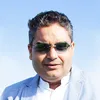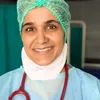[Startup Bharat] Lucknow-based Dectrocel Healthcare and Research’s AI tool can screen COVID-19 for just Rs 100
The startup has developed an AI screening tool that can detect COVID-19 through real-time chest X-ray images and can diagnose conditions like COVID-19 induced pneumonia and other related problems.
The COVID-19 outbreak has posed many challenges to people across the country. While people are in constant fear of contracting the virus or losing their loved ones to the pandemic, other factors like the cost of the treatment itself is troubling many.
To ease their burden, was started by Ankit Shukla, Saumya Shukla, and Nikhil Misra in August this year.
The Lucknow-based startup has come up with a low-cost Artificial Intelligence (AI) tool for accessible diagnosis.
The startup aims to bring personalised medicine and evidence-based medicine to India, and is also looking to minimise the doctor-patient ratio in the country.
The World Health Organisation (WHO) mandates there should be one doctor for every 1,000 individuals. India is woefully lagging behind with one doctor for every 1,500 people. But according to Dectrocel founders, the actual numbers are even worse, and they say India has an average of one doctor per 11,082 patients.
So far, the startup has piloted its products in a handful of hospitals in Lucknow and has done more than 300 tests.
The product
The startup has developed a range of solutions to provide speciality healthcare for the bottom of the pyramid at just Rs 100.
For COVID-19, the team has developed an AI screening tool, which can detect COVID-19 through real time chest X-ray images. It can diagnose conditions like COVID-19 induced pneumonia, round glass opacities and consolidation, lesion localisation in the lung parenchyma with COVID-19 risk and affected area estimate without the intervention of a human being.
Ankit says, it takes less than two minutes to complete a screening. The X-ray image is uploaded in the software interface and the report is generated in less than a minute.
Other solutions developed by the startup include tools to detect respiratory disorders like tuberculosis in real time, breast cancer detection tool, AI tool for pneumonia screening in children, and AI screening tool for rare genetic disorder in children through facial phenotype screening.
“The phenotype screening with the help of AI diagnostic tool just by clicking the picture of the face of the child through a camera, the algorithm is able to detect abnormalities of rare genetic disorders with a turnaround time of two minutes. This makes it possible to screen the large population, especially when the statistics clearly reflect Indians at a very high risk of rare genetic disorders,” says Ankit.
He adds, “Artificial Intelligence diagnostic solutions help optimise technology in detecting diseases and therefore moving towards implementing precision medicine and hypothesis free diagnostics for better health outcomes.”

The founding team
Dectrocel founders, all in their early thirties, have a background in the field of technology and medicine. They believe that the gap of doctor-patient ratio in countries like India can be filled effectively with technology.
Ankit Shukla is a PhD holder in AI in Medicine from Faculty Of Medicine University Of Queensland Brisbane, Australia, and has an MS in Infectious Diseases, Faculty Of Medicine NUS Medical School, Singapore.
Saumya Shukla, who is Ankit’s sister, is also a researcher in health economics studying Health Systems at Super Specialty Medical Institute at Sanjay Gandhi Postgraduate Institute Of Medical Sciences & DSMNRU, India. Nikhil Misra is a researcher in AI and Machine Learning as applied to Medicine from IIT, Kanpur.
Saumya underlines a WHO report published in 2019 which states that more than a million people in India die every year because of misdiagnosis, medical negligence, and inaccessibility of the medical infrastructure. The problem is further aggravated by the lack of doctors and therefore there is immense pressure on the doctors.
The tools were initially developed by Ankit during his research work, which he wanted to bring to India to solve the above mentioned pain points in India.

[L to R] by Ankit Shukla, Saumya Shukla, and Nikhil Misra
Nikhil says the current pandemic has really been an eye opener and exposed the vulnerability in the Indian healthcare system, and that is why the Government of India is pushing AI screening and teleradiology in the hospitals.
“We are the right team to collaborate with the government, as we are qualified in the medicine and the AI field,” says Nikhil.
The business
Dectrocel operates on a pay-per-use model, which allows low volume clinics, radiology centres, and rural areas to utilise these solutions.
“We are charging Rs 100 plus GST, depending on the image modality - whether it is an X-ray or a CT Scan. The CT Scan will cost Rs 200. The customer has to pay Rs 100 + GST to the hospital/ health clinic/ diagnostic lab per test scan,” says Ankit.
Meanwhile, Dectrocel has also bagged consulting projects from Google and Apollo Hyderabad for its products, which are still in the development phase, says Ankit.
The startup is still in the early stage of garnering revenues. Ankit says the company will generate revenue via the sales of diagnostic testing services to the hospitals, health clinics, general practitioners, and medical diagnostic labs.
“In the future, we will generate revenues via licensing or royalty or commission fee to other diagnostic service providers,” he adds.
In terms of accuracy, Ankit says all the products are research and evidence-based and are created over the years with great quality of data sets.
Speaking about competition, Saumya adds there are similar technologies in India, but they are still in the development stage. She also adds the market is huge in India, and Dectrocel is poised to leverage it.
Funding and future plans
Saumya says all three have put seed capital through personal contribution and revenue generated through consulting projects to the tune of Rs 25 lakh towards R&D and product development.
Going forward, the startup plans to setup at least 20 screening sites in seven cities each, including Lucknow, Delhi NCR, Bengaluru, Hyderabad, Chennai, Kolkata, and Mumbai in the next 12 months.
Edited by Megha Reddy


![[Startup Bharat] Lucknow-based Dectrocel Healthcare and Research’s AI tool can screen COVID-19 for just Rs 100](https://images.yourstory.com/cs/2/70651a302d6d11e9aa979329348d4c3e/SB1-1602754435465.png?mode=crop&crop=faces&ar=2%3A1&format=auto&w=1920&q=75)






